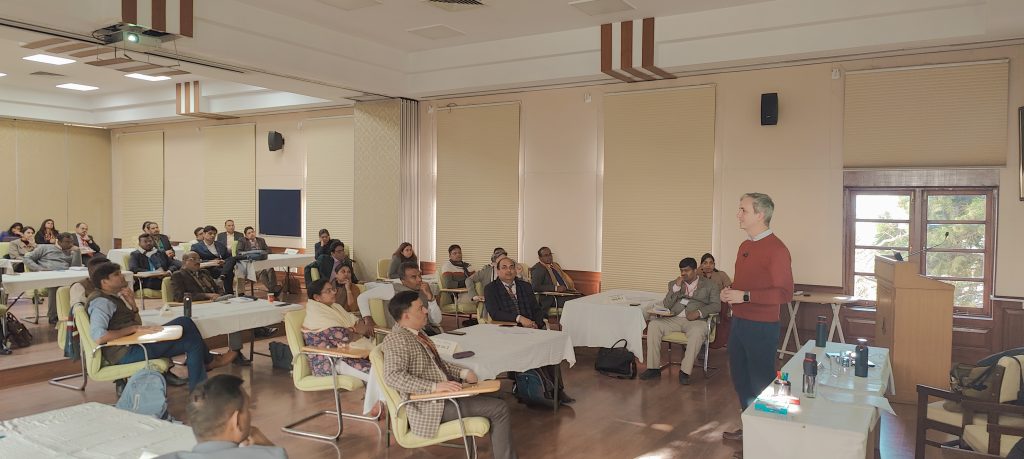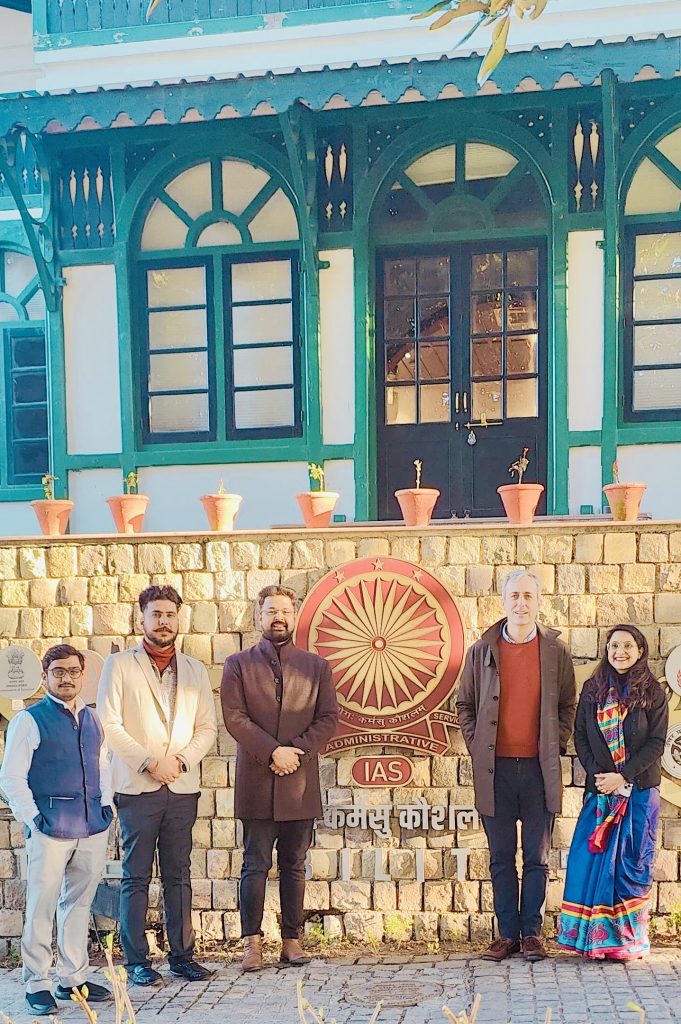In Conversation: Innovative Leadership Training for India's Civil Servants
As governance challenges become more intricate and multifaceted, the ability to make strategic, informed decisions is crucial for public administrators. In response to this need, the GKII and the Lal Bahadur Shastri National Academy of Administration (LBSNAA) partnered to deliver a cutting-edge leadership training program for India’s Civil Services officers. Central to this initiative is the Friday Night at Emergency Room (FNER) simulation, which is designed to sharpen decision-making under pressure and equip officers with tools to manage complex, real-world crises.
By placing participants in high-stakes, immersive scenarios that simulate public health emergencies in hospital settings, the program emphasizes systems thinking. As a result, civil servants are better prepared to navigate a broad spectrum of challenges, from healthcare to infrastructure. On January 15, 2025, the third edition of FNER training was delivered at LBSNAA in collaboration with Brian Wahl, Assistant Professor of Epidemiology at Yale University, who had been instrumental in initiating the collaboration between Johns Hopkins and LBSNAA during his tenure at Hopkins.

In this interview, we sit down with the JHU team leading this program – Neetisha Besra (NB), Aman Mohan Mishra (AM), Kanchan Pandey (KP), Meghashish Sharma (MS) and Siddharth Mohite (SM) – and explore the evolution of the FNER training, its impact on the participants, and the role of systems thinking in shaping the future of public administration.
Can you start by sharing some background on the FNER training? What inspired the collaboration between Johns Hopkins and LBSNAA for this training, and why is this initiative important for public administration in India?
NB: Certainly! The FNER training initiative originated from a collaboration between Johns Hopkins and LBSNAA, which is India’s premier institution for civil services training. This partnership was initiated by Dr. Rakesh Gupta, a distinguished Hopkins alumnus and Additional Secretary to the President of India.
As part of the Indian government’s Mission Karmayogi, also known as the National Programme for Civil Services Capacity Building, LBSNAA conceptualized IAS PRO (Professional Reorientation Options) program that offers sector-specific training to mid-career IAS officers related to their posting. Dr. Gupta was in the board of Health and Medical Education sector and envisioned incorporating systems thinking into the training of IAS officers. He had experienced the FNER training during his time at Hopkins and vividly remembered its impact. When Johns Hopkins was approached for a collaboration with LBSNAA, we proposed three programs, one of which was the FNER simulation. Its hands-on, immersive approach made it an ideal fit, and it was chosen as a pilot due to its engaging nature.
AM: The initiative is vital for public administration in India because IAS officers operate in highly complex, dynamic environments with limited resources, where decision-making often requires managing a multitude of factors under pressure. Hospitals, often at the center of public health systems, are some of the most intricate systems to navigate. The FNER training equips officers with the skills to approach such challenges using systems thinking — an approach that extends far beyond healthcare to sectors like infrastructure, education, and disaster management.
The FNER simulation is a unique tool for teaching systems thinking. How does it resonate with IAS officers, and what makes it particularly effective in addressing their professional challenges?
SM: The FNER simulation is remarkably effective because it mirrors the real-life complexities and challenges faced by IAS officers in the field. For instance, resource allocation, managing competing priorities, and making decisions with limited information under tight deadlines are all part of the simulation, which directly resonates with the daily responsibilities of IAS officers. It is not just about healthcare but is applicable to any complex administrative system.
KP: One of the most intriguing aspects of the simulation is how it resonates with non-medical participants. Many of the officers who come from backgrounds outside healthcare initially approach the simulation with some uncertainty. However, their fresh perspective often allows them to think outside of traditional silos, focusing purely on the systems thinking framework. They engage deeply with the challenges presented in the simulation and apply the principles learned to scenarios in their own sectors. This cross-pollination of ideas helps all participants see beyond the confines of their specialized knowledge and apply the lessons to broader governance challenges.
MS: Another powerful aspect of the FNER simulation is how it involves group-based problem solving. This approach closely mirrors the collaborative nature of governance in India, where decision-making is often the result of input from various departments and stakeholders. During the simulation, participants are required to negotiate, manage inter-departmental coordination, and make collective decisions — skills that are critical to the roles of IAS officers. The opportunity to practice these skills in a low-risk environment helps officers prepare for high-pressure situations in their professional lives.

Reflecting on this third iteration of the training, how would you describe its evolution since the first session? What refinements/changes have been made to better meet the needs of IAS officers?
AM: Over the course of three iterations, the FNER training has evolved considerably based on feedback from participants and facilitators. The first iteration was focused primarily on introducing systems thinking concepts. However, early feedback highlighted that while the framework was valuable, the examples used were not always relatable to the participants’ daily challenges. For the second iteration, we incorporated more India-specific case studies, which allowed participants to see the practical relevance of the systems thinking approach in their professional lives.
We’ve also made adjustments to the structure of the simulation itself to better align with the time constraints of LBSNAA’s training schedule. The core mechanics of the simulation were maintained, but we streamlined the gameplay to ensure that participants could get the most out of their time. The adjustments have made the training more intuitive, ensuring that the core learning objectives are achieved while also respecting the time constraints of the training program.
Could you share a bit about the composition of the training batch? What roles or sectors were represented, and how did their diverse backgrounds contribute to the discussions?
SM: The recent training was attended by 54 IAS officers from the 2003 to 2010 service batch. All of them were senior officers with at 15-18 years of service and represented 14 different cadres.
MS: In the previous editions, we’ve seen participation from officers representing a wide range of departments, including health, education, rural development, and postal services. This diversity is one of the key strengths of the training, as it allows for a cross-pollination of ideas and approaches. For instance, an officer from the postal services shared their experiences of managing a large-scale logistical challenge during a period of reduced demand. Meanwhile, an officer from the health sector shared insights into managing coordination during a public health crisis like COVID-19.
The diversity of perspectives helps officers understand how systems thinking could be applied across different sectors. Officers from non-health backgrounds are able to view the healthcare-related challenges through a different lens, which helps them approach solutions with a broader perspective. The varied backgrounds of participants led to richer, more innovative discussions.
Were there any memorable moments or standout insights during the reflective debrief that you’d like to share? Do you recall any feedback from a participant that stood out?
KP: The feedback from participants was overwhelmingly positive. Many described the program as one of the most interactive and impactful sessions they had attended at LBSNAA. One of the standout moments for me was seeing non-medical participants engaging deeply with the simulation. Their approach was notably different from the medical professionals, as they focused entirely on the systems thinking framework and applied it to their own sectors. One group, in particular, treated the simulation as a real-life challenge rather than a game, which sparked a lively and engaging discussion.
SM: I remember one participant, a doctor-turned-administrator, who mentioned that while the simulation closely mirrored hospital realities, it also forced them to think beyond their usual professional norms. This realization was a powerful moment for the group, as it reinforced the adaptability of systems thinking across different areas of governance.
Looking ahead, what opportunities do you see for scaling or adapting this training for a broader audience?
AM: Looking ahead, there are several opportunities for scaling and adapting the FNER training. One possibility is tailoring the simulation for state-level administrators, as they often face different challenges than those at the central government level. We could also include more India-specific scenarios in the simulation, covering diverse regions and issues, such as healthcare during monsoon floods or managing public health in rural areas.
SM: Another opportunity for expansion is to explore virtual iterations of the training. This would allow us to reach a wider audience, particularly those who may not have the resources to attend in-person training sessions at LBSNAA. I also see the potential to adapt the simulation for other sectors, such as education or infrastructure, where systems thinking could drive significant improvements in decision-making.
NB: The methodology used in FNER has the potential to serve as a model for other training programs within LBSNAA and beyond. By institutionalizing systems thinking as a foundational module in civil service training, we could promote better decision-making and collaboration across all levels of public administration. There’s also potential for expanding this model internationally, adapting it for other countries with similarly complex governance structures.